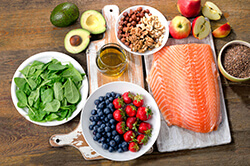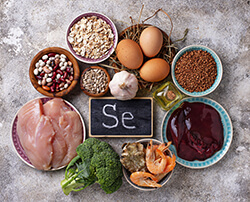
When our parents told us “You are what you eat”, they didn’t say it for nothing. Physically and psychologically, what we consume plays a big role in all the changes that happen in our bodies. We have always known about what’s good for our skin, our heart, our eyes or even our bones. But did you know that food also plays a big role in your daily mood swings? Yes, as far fetched as that may sound, you might be interested to know that breakfast, lunch and dinner could have a heavy bearing on how you think, how you function and even what you say, from the mental perspective.
But how is that, you may ask?
In short, certain nutrients such as vitamins and minerals derived from the food we consume naturally help to regulate or boost mood-related hormones such as dopamine, noradrenalin and serotonin. So consuming foods that are high in Vitamins, fatty acids, zinc, magnesium or selenium could directly and indirectly help to boost production of these happy hormones and possibly keep you away from depression and negative vibes.
Are these foodstuffs difficult to find or would they be expensive? Well, we’ve done the homework and listed them for you below:
 |
Vitamin C is essential to body’s ability to make neurotransmitters, including dopamine, noradrenalin and serotonin. These neurotransmitters provide mood stability and the prevention of depression. A 2018 study on 139 young adult males found that those who consumed the most Vitamin C had the lowest reported feelings of depression, confusion and anger. Food sources: Oranges, lemons, strawberries, bell peppers and broccoli. |
 |
Vitamin B group helps to control and regulate moods also combat the problems with mood swings. It has similar effect as antidepressants to increase serotonin uptake. For example, Vitamin B6 is effective in treating premenstrual depression. Studies have found that Vitamin B6 deficiency can lead to depression. |
 |
Food sources of B6: Carrots, spinach, sweet potatoes, green peas, lentils and other legumes and bananas. Food sources of B12: Animal products such as fish, lean meat, poultry, eggs, low-fat and fat-free milk and fortified breakfast cereals. |
 |
Omega 3 fatty acids have a huge impact on the maintenance of healthy brain function in people of all ages. People with plenty of EPA (Eicosapentaenoic acid) and DHA (Docosahexaenoic acid), especially have been found to experience less depression. And other studies have found that Omega 3 fatty acids are effective in improving depression symptoms among adults and children. Food sources: Chia seeds, flax seeds and algae-sourced EPA and DHA supplement, wild salmon, herring and sardines. |
 |
Research shows that people with the worst depression often have the lowest levels of Zinc. Zinc deficiency can lead to symptoms of depression, ADHD, difficulties with learning and memory, seizures, aggression and violence. Zinc replenishment has been found to be therapeutic in treating mood disorders. Food sources: Legumes (especially when sprouted), seeds, nuts, whole grains, shellfish, dairy and meat |
 |
Magnesium is a cofactor in more than 300 reactions in the body to facilitate the hormone balance, enzyme activity and neurotransmitter function that regulate the mood and overall health. Magnesium became the first medically acknowledged substance used to treat depression in 1921. Food sources: Legumes, tofu, whole grains, dark chocolate, banana and leafy greens. |
 |
Selenium is an important mineral for brain health. Studies show that supplementation with Selenium reported a general elevation of mood. They also reported a decrease in anxiety, depression, and tiredness. A 2014 study in the Journal of Nutrition observed among 978 young adults; those with the lowest moods also had the lowest blood levels of Selenium Food sources: Brazil nuts, wild yellow fin tuna, mushrooms, lentils, octopus, beef, spinach, eggs, cottage cheese and broccoli. |
Surprised that the much of the foodstuffs we are talking about are just your common fruits, vegetables and meat found in your local supermarkets?
If you thought the food that you eat plays no role in your mental well being, well, now after having seen the above, it’s probably time to rethink what you eat. Your happy hormones could easily be boosted with common foods found in your refrigerator, there’s really no reason to go all out seeking expensive holidays or retreats to mend curb stress and depression.
Mood boosting foods are essentially meant to give your outlook on life a positive lift. They don’t cost much and are not very difficult to find either, as you would probably know by now. And after all, let’s not forget that the benefits are two fold – most of these foods are extremely good for your general health. Combined with the benefits to your mental health, you would probably be living a long, happy and sick-free life.
Just imagine eating salmon or salad instead of a birthday cake at a party, and fruit juices instead of alcoholic or carbonate drinks. You’ve always had your diet to partly blame for every time you fall sick or feel tired to get up from your office chair, but these small baby steps towards improving your mental health could really have a good mood jump at you, and help you feel more upbeat about life. It goes without saying that when your mind is healthy, your body might follow suit.